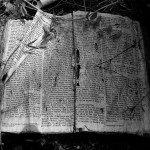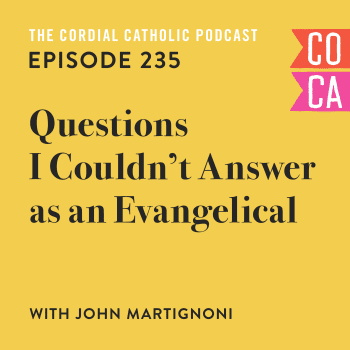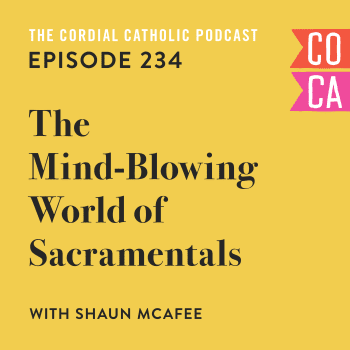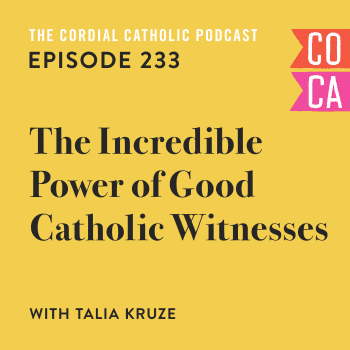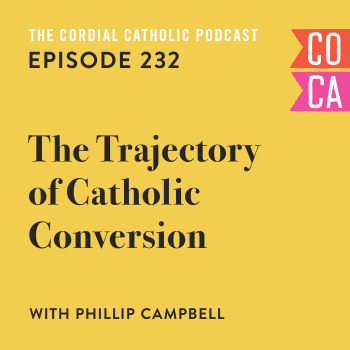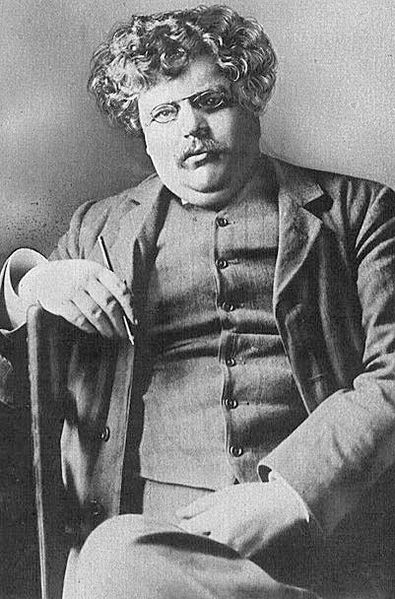
I’m on a G.K. Chesterton kick today.
Chesterton, a Catholic convert from Anglicanism (and an atheist before that) is an intellectual giant in terms of modern Christian writers. He is eclipsed, in writers of his era, perhaps only by C.S. Lewis, another hero of Christianity who actually credited Chesterton’s writings for his own conversion.
As an atheist himself, Lewis approached Chesterton’s The Everlasting Man with a measure of skepticism. He later wrote in his autobiography Surprised by Joy that,
A young man who wishes to remain a sound atheist cannot be too careful of his reading.
He was referring to Chesterton and, in hindsight, Lewis wasn’t careful enough.
I think this same principle applies to a Protestant: A Protestant who wishes to remain a good Protestant cannot be too careful of his reading.
In hindsight, I haven’t been careful enough either.
My wife, who is becoming known for her Catholic zingers, once commented that I’m probably the best non-Catholic Catholic out there. The best Protestant Catholic At least, the most knowledgeable Catholic—even though I’m a Protestant. OK, I’m ruining the joke, and she could tell it much better than I can, but the point is: As I read more and more about the Catholic Church I realized that I, as a Protestant, probably knew more than most Catholics.
I was becoming a really good Catholic, the only problem was I was Protestant.
I’ve talked about the lack of good faith formation in the Catholic Church—and it’s truly shocking—but what I found in my not-so-careful reading was that once you began to read about the Catholic Church and her traditions and practices there’s an awful lot to read. Fifteen hundred years, in fact.
And reading, as I said earlier, has a tendency of snowballing.
When I first started seriously reading Catholic authors I justified it by saying it was important to know both sides of the argument. If I was going to be a Protestant I needed to know why, which meant I needed to know what I was protesting against. My faith tradition, five hundred years ago, split off from the Catholic Church and it was my due diligence to understand why that happened. It was a conscience effort to break away from the Catholic Church back then; nothing has changed, it should be a conscience effort today to remain broken away. This made sense to me.
Again, Chesterton rings true. In The Catholic Church and Conversion, his own story of becoming a Catholic convert he writes,
The convert takes his first step rather unwittingly when he decides he is going to be “fair” to the Catholic Church.
I was giving the Catholics their fair shake, that’s what I told myself, that’s what I told others, that’s what I told my beautiful wife, but like Lewis writing about Chesterton, one cannot be too careful about what one reads.
My “fair shake” for the Catholic Church gradually began to work at my own understanding and my own long-held beliefs.
As a thirty year old I’ve been Protestant for more than half my life. I wasn’t born a devout Protestant, I worked up to it, and you can read about that here too but the point is, I’d read a lot of Protestant literature. I’d read the classics, I’d read the emergent church stuff, I’d read Eugene Peterson, Dallas Willard, and N.T. Wright. I had even read some of the Church Fathers (who weren’t very Protestant in hindsight). I had done a lot of reading on our side of the fence and as my interest grew in Catholicism I thought, naively, that it would be “fair” to read stuff from there side as well.
But the more Catholic authors I was fair to the more Catholicism made sense.
Some would argue, “Of course, if you read enough of a certain type of something you’ll be convinced be it.” That is to say, if you read enough about Catholicism you’ll be convinced to become a Catholic. I don’t think the second logically springs from the first though.
“By that same token,” I could respond, “the only reason you’re a Protestant is because you’ve read lots of Protestant literature.”
I don’t think the argument is honestly very sound.
Chesterton, in my opinion, makes more sense.
Once I decided to be “fair” to the Catholic Church and read what the Catholic Church actually had to say, rather than what I thought (or had been told) it had to say I began to see the sense in it. It began to make sense. Once I was “fair” I saw the strengths in Catholic thought. Once I was “fair” I saw the weaknesses in my own. Once I was “fair” I began to put puzzle pieces together that before, for me, never quite fit properly together anyway.
I’m not, I don’t think, becoming Catholic because I read a lot of Catholic literature. I did read a lot, and I’m reading tons more, and my wife is probably right, I know more than most Catholics about their own faith. But once I decided to be fair to Catholicism and understand the faith from within, from its own writers, I took the first fatal step that Chesterton warned against.
And there has to be, by the sheer nature of things, a bit of the work of God in my heart and mind, too.

